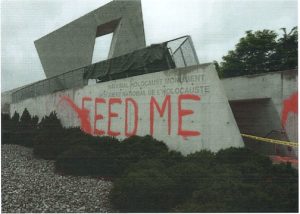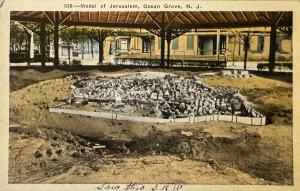TORONTO — Retired Maj. William Hans Schmidt has nothing but praise for the Canadian Forces, in which he served in for nearly 20 years. However, Schmidt says that when it comes to helping wounded or traumatized war veterans back home, Veterans Affairs Canada has a lot of work still to do.
“One hundred and fifty [Canadians] lost their lives in Afghanistan. But for every one who loses their life, 10 are wounded,” Schmidt told The Canadian Jewish News. “These people served the country. The country should serve them thereafter.”
Schmidt, 57, spoke to a small crowd at Branch 66 of the Royal Canadian Legion in Toronto Mar. 24, at an event co-sponsored by the Temple Sinai Brotherhood, the first of several events and talks with Canadian veterans now being planned, Temple Sinai program chair Joel Cadesky said.
Schmidt served in the Canadian Armed Forces from 1976 to 1995 and spent most of the early 1990s in Iraq and Kuwait. As a commander of the UN logistics force for UNIKOM (United Nations Iraq-Kuwait Observation Mission), Schmidt led officers from 33 nations.
His years in the Middle East had their highs and lows. On the sunny side, Schmidt led one of Canada’s major contributions to Kuwait: the re-establishment of Kuwait’s hockey team. Much to the major’s surprise, many Kuwaitis were passionate for the sport and even had a beautiful indoor hockey rink to play on, not far from the war zone.
On the other hand, Schmidt recalled the difficulty of getting support and money from the UN. The job became tougher when the Iraqi and Kuwaiti regimes denied killings and attacks mentioned in the major’s reports.
“The United Nations is handicapped. Their hands are tied. Money is wasted,” Schmidt told the Legion crowd. “The only way to assist – and I think Canada’s doing it the right way – is by providing troops. It is more feasible for Canada to send in troops than it is to just throw the money out to pasture.”
Although Schmidt said he wanted to be a pilot, he ended up learning about logistics when there were no pilot jobs available. Logistics is not just transporting supplies from one point to another, he explained, but preparing and planning how to get materials from their source to the soldiers who need them.
Working in logistics, he helped to build camps for British and American forces in Afghanistan. During this job, he said, he noticed how the U.S. camp was tiny and ill equipped, almost entirely unprepared to take in 12,000 marines.
Schmidt said he ended up getting the American base built by taking initiative where the U.S. contractors had not.
“Canadians, and I’m proud to say this, are the best in logistics in the whole globe,” Schmidt says. “That is why the UN always asks for Canada’s help. We are proven logisticians. We know how to give what is needed for the boots on the ground.”
He said, however, that the efforts of Canadian soldiers are worth less without adequate funding and staffing for Veterans Affairs. His son, Jonathan, fought in Afghanistan and almost lost his life when a Taliban member shot at him with an rocket-propelled grenade – and missed by inches.
“He’s doing exceptionally. He has got his mental faculties. He’s the first Canadian soldier to top the U.S. army ranger course,” Schmidt said of his son, who also earned a medal for his duty. “But that means nothing when all I hear is that nothing’s being done for the soldiers back here suffering, physically and psychologically.”
Schmidt retired in 1995, before he was even 40. Although he said he thought he would stay in the Forces for 35 years, he said he got scared that serving for that long would ruin him. He decided to try doing logistics in the civilian world.
Today, Schmidt works in logistics for automotive tech company Mevotech in Toronto. He says he can’t see himself retiring.






